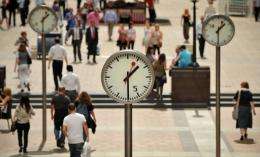Timekeepers gathered in Geneva to thrash out a contested proposal to abolish a 40-year-old practice of adding the occasional second to world time.
Timekeepers gathered in Geneva on Thursday to thrash out a contested proposal to abolish a 40-year-old practice of adding the occasional second to world time.
Members of the International Telecommunication Union (ITU) are pondering the future of the "leap second."
It is the extra moment that is added to atomic clocks to keep them in sync with Earth's rotation, which is slowed a tiny bit by the gravitational pull of the Sun and the Moon.
Without the leap second, hi-tech clocks would race ahead of solar time, amounting to a discrepancy of about 15 seconds every 100 years, experts believe.
The second has been added on 24 occasions since the ITU defined Coordinated Universal Time (UTC) 40 years ago.
But critics say the practice should be scrapped.
Every time a second is added, the world's computers need to be manually adjusted, a costly practice that also boosts the risk of error.
"A decision is most likely, either by consensus or perhaps by a vote," said an ITU spokesman ahead of the session at the Radiocommunication Assembly later Thursday.
If the vote is passed, it would need to be ratified by the ITU's World Radiocommunication Conference beginning next week.
The United States and France are among those countries which supported the move in a survey carried out by the body last year, while Britain, Canada and China were against.
"It's impossible to predict when we will need the leap second to be inserted," Vincent Meens, chairman of the ITU's dedicated study group, said at a Tuesday conference.
"The reason for this is due to the rotation of the earth and some events like earthquakes that can slow the earth a bit more than expected.
"All computer systems need to be adjusted with this leap second, and there is always a risk of error, so we have to test them after the introduction of the leap second. If we remove it then we don't have this problem anymore."
When required, leap seconds are always introduced at midnight on June 30 or December 31 and Meens cited the case of a space company that never launches a rocket the day following the change.
"They have to test their programme, so they will never launch a rocket on January 1 or July 1, just to make sure that the software is correct," he said.
"It will be an important decision because the problem of introducing the leap second will disappear and we will have a more standard time than the one we have today."
The Paris-based International Bureau of Weights and Measures said in a recent statement that there were "an increasing number of users of precise timing for whom the leap second causes serious technical problems."
(c) 2012 AFP





















